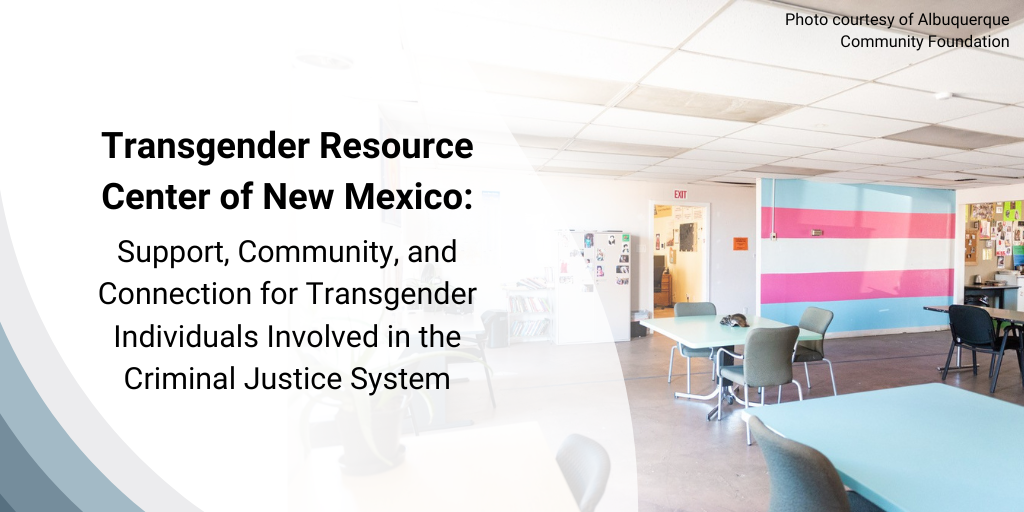The Transgender Resource Center of New Mexico (TGRCNM) is a community organization that has provided a wide range of services to Albuquerque and surrounding communities for more than 15 years. Founders Adrien Lawyer and Zane Stephens decided to “build their own” when they couldn’t find the types of services and supports they needed as transmasculine men in Bernalillo County, where Albuquerque is located. Since beginning with a web-based resource list and a few support groups, TGRCNM has grown to now employ 10 people across different roles and typically provides services to about 20 to 30 people at any given time. They provide support and advocacy, education, and direct services for transgender, nonbinary, and gender non-conforming individuals in their community, criminal justice system, and beyond, including the following:
- Support groups (10)
- Food justice program
- Case management and community referral
- HIV programs, including testing and syringe exchange
- Mental health services
- Legal supports
- Connection to housing and community resources
- Employment opportunities
Low-Barrier, Flexible Supports and Privacy
Executive Director T. Michael Trimm describes TGRCNM as a “low- to no-barrier” program. “Anybody that identifies as transgender, non-binary, or gender non-conforming can use our services,” Trimm explains, adding, “and we gladly coordinate with other agencies and organizations, to ensure the people we serve are getting what they need.” That includes working with local service providers to help them understand and practice culturally competent and welcoming care for those who are transgender.
In keeping with their low-barrier approach, TGRCNM allows service utilizers to share as little or as much personal information as they choose. Although this means they don’t have the detailed data on outcomes or long-term follow-up often required for federal grants, Trimm believes in this policy. “Protecting privacy is of utmost importance at TGRCNM,” Trimm says. “We anonymize our records and don’t require certain information to use our services to make our clients feel comfortable accessing whatever they need from us.”
Services for Those with Criminal Legal System Involvement
Advocacy and support for those impacted by the criminal justice system is a pressing need within the transgender community. People who are transgender have an increased risk of involvement with the criminal justice system due to their higher likelihood of experiencing known correlates of justice system contact, such as homelessness, interpersonal violence, and poverty. One research group found that a person who is transgender is more than 13 times more likely to be sexually assaulted while incarcerated than a cisgender peer. Because of this elevated risk, the Prison Rape Elimination Act requires prisons to have a plan and procedure for protecting LGBTQIA+ individuals.
In Bernalillo County, TGRCNM has a formal memorandum of understanding with the Metropolitan Detention Center (MDC). As a result of this agreement, transgender people identified during the MDC intake process will be connected directly with TGRCNM’s in-reach coordinator for their Inside Advocacy Program, which is also available to incarcerated individuals who self-refer. TGRCNM’s Inside Advocacy Program offers legal support and other services for those impacted by the criminal justice system.
“The Inside Advocacy Program services are very individualized to the needs of the person we are working with,” Trimm says. For those currently experiencing incarceration, explains Trimm, “We provide legal advocates, create care packages with commissary items, and connect people to services in preparation for reentry.” TGRCNM’s Inside Advocacy team will try to work with anyone who reaches out for help from any correctional facility, even people from out of state. In addition to their work at MDC, the Inside Advocacy team works with 10 other correctional facilities
Education and Outreach Programming
TGRCNM also offers training and education programs to community stakeholders to help them better understand and become allies of and advocates for transgender individuals. The Transgender Cultural Fluency Training is a 2-hour introductory training that provides a foundation for participants to learn more about what it means to be transgender. The training works to clarify common misconceptions about transgender identity and encourages trainees to become familiar with the challenges transgender communities face. TGRCNM has conducted more than 3,000 trainings nationwide and across sectors, including law enforcement, healthcare providers, faith organizations, educational institutions, and private businesses.
“One of our niches for this training is corrections,” says Trimm. “While we would like to see no transgender people incarcerated, we are realists. Until then, we work with correctional stakeholders to ensure their facilities are safer for trans and non-binary residents.” Communities interested in receiving the Transgender Cultural Fluency Training can contact TGRCNM.
Like what you’ve read? Sign up to receive the monthly GAINS eNews!




